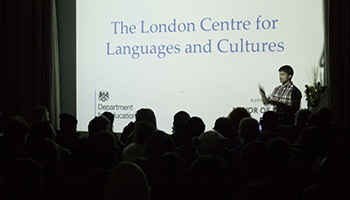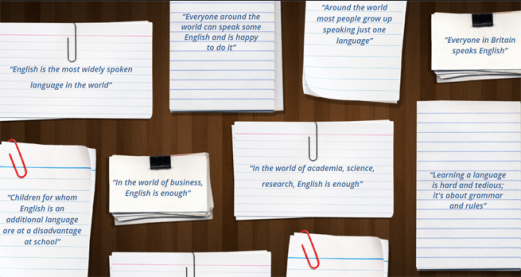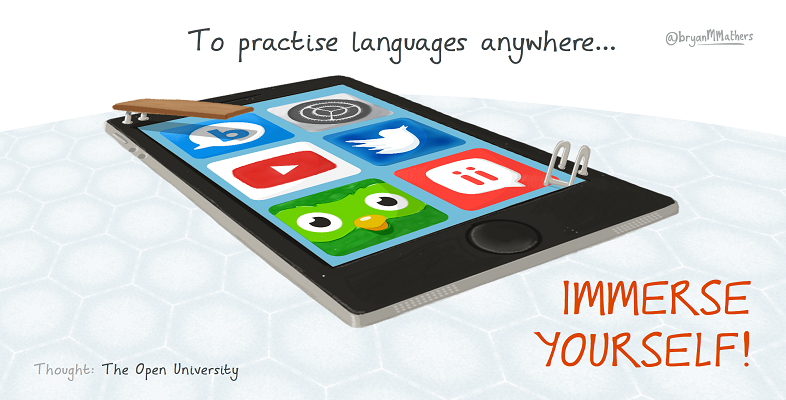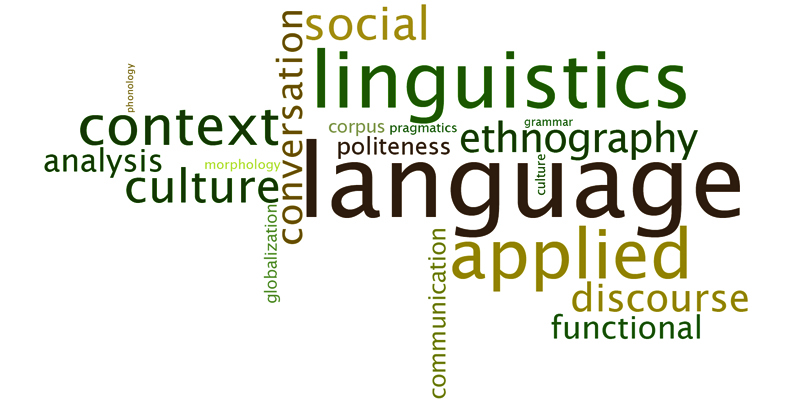In July 2015, the London Centre for Languages and Cultures hosted a Colloquium: “A Future for Languages in Schools?” Representatives from schools, universities, government, and language organisations discussed the serious issue facing modern foreign languages as a subject…

Encouraging and promoting the study of languages
Since 2013, the London Centre for Languages and Cultures, established jointly by The Open University and Pembroke College Oxford, has been encouraging and promoting the study of modern languages, both in schools and in universities. The LCLC has worked closely with pupils and teachers from over a dozen schools in the three London boroughs of Hammersmith & Fulham, Kensington & Chelsea, and the City of Westminster, through a series of study days, summer schools, teacher CPD events and online training and resources. In addition, through cooperation with a project led by the University of Westminster and Network for Languages London, the LCLC has begun to work with primary schools.
The Open University has taken the lead in working with teachers, helping practitioners to keep abreast of the latest academic developments in language pedagogy by providing subject-based and pedagogical training, both face to face and online. Subject-specific seminars have been run on topics as wide-ranging as West African French literature, Spanish phonetics, German politics and Italian Futurism. Meanwhile, the OU’s specific expertise in teaching practice and pedagogy has been utilized to provide training for teachers in various topics including dyslexia and language learning, listening skills, and teaching translation. A library of free open educational resources (OER) is available through the OpenLearnWorks project website offering language teachers the possibility to communicate with each other, across different schools, using a dedicated forum to discuss and exchange their ideas around a series of online activities.
‘A future for languages in schools?’
The Colloquium in July 2015, entitled “A Future for Languages in Schools?” was hosted by LCLC to address the future of modern foreign language learning and teaching. Various interested parties including representatives from schools, universities, government, and language organisations came together to discuss the issues facing modern foreign languages as a subject. The opening keynote speech saw Peter Horrocks, new Vice-Chancellor of The Open University, talking about his experiences of modern foreign languages both at the OU and previously as Director of the BBC World Service (a transcript is available by clicking here). The second keynote of the day was a varied and often humorous speech delivered by Oliver Miles, former British Ambassador to Libya, Luxembourg and Greece, about his life as a serial language-learner. Delegates also heard from Kathryn Board and Teresa Tinsley – authors of the British Council and CfBT’s Language Trends Survey, as well as being external evaluators of the LCLC project.
At the heart of the Colloquium were working groups, where delegates discussed the major issues facing language education in three key areas. Groups were led by experts in their respective fields:
- the ‘Schools’ working group was led by Pam Haezewindt, Secretary of the National Association of Language Advisors and former HMI & Ofsted Specialist Subject Advisor for MFL;
- ‘Universities’ was led by Dr Tim Farrant, Fellow and Tutor in French at Pembroke College, Oxford;
- and finally ‘Policy’ by Bernardette Holmes, Campaign Director of Speak to the Future, and Bye Fellow at Downing College, Cambridge.
Each chairperson reported back in the final plenary session of the day, chaired by Professor Katrin Kohl, Professor of German Literature at Jesus College Oxford. Findings from the Colloquium are currently in the process of being written up for publication by the LCLC, with the intention of taking forward a series of action points and creating a permanent steering group which can continue to address these pressing issues going forward.
Moving forward
 The LCLC intends to build on the success of its first two years, continuing to work with pupils, teachers and universities, by being based from October 2015 in a new hub school, Westminster Academy. The Open University and Pembroke College continue to support the Centre and its work with teachers and pupils. Since the launch of its new website in July 2015, the LCLC is expanding its online presence with a host of new video and web-based resources, in both subject-specific and broader pedagogical topics, for language learners and teachers. In combination with an ongoing programme of face to face events and activities, the Centre aims to continue to make a positive difference to the standing of modern languages education in the UK.
The LCLC intends to build on the success of its first two years, continuing to work with pupils, teachers and universities, by being based from October 2015 in a new hub school, Westminster Academy. The Open University and Pembroke College continue to support the Centre and its work with teachers and pupils. Since the launch of its new website in July 2015, the LCLC is expanding its online presence with a host of new video and web-based resources, in both subject-specific and broader pedagogical topics, for language learners and teachers. In combination with an ongoing programme of face to face events and activities, the Centre aims to continue to make a positive difference to the standing of modern languages education in the UK.
The LCLC was funded by the London Schools Excellence Fund (supported by the Mayor of London and the Department for Education).
You can find out more about the LCLC at their website: www.lclc.info or by following the LCLC on Twitter: @London_LangCult
-
Explore more about languages on OpenLearn
-
Find out about the European Day of Languages
-
Try our language courses for free!












Rate and Review
Rate this article
Review this article
Log into OpenLearn to leave reviews and join in the conversation.
Article reviews